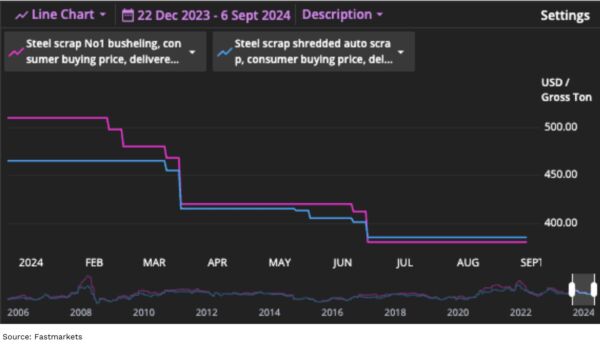
After no movement in August, the ferrous scrap metal market also settled flat in Chicago for September, with the prices for industrial grades of scrap metal hanging on for the second month in a row.
Chicago’s Ferrous Scrap Market
Ferrous grades of scrap metal in Chicago held steady at August’s price levels, with the exception of shred, which dropped $15 per gross ton. Lackluster export markets, 15 scheduled mill outages, and an influx of cheap billets entering the market were concerns heading into September. However, a recent increase in Hot Rolled Coil (HRC) prices and stable demand in the Chicago market helped stabilize conditions, preventing further price decline. Notably, there has been no price increase for most ferrous scrap grades in Chicago since December 2023.
“Sideways feels like a win at this point,” says Lou Plucinski, President. “In 2024, anything is better than another month of declining scrap metal prices.”
The $15 per gross ton price drop for shredded scrap in Chicago created a slight spread between shredded scrap and higher-quality prime grades like No. 1 Bundles and Busheling. Typically, these prime grades, which are in higher demand for steel production, maintain a premium over shredded scrap due to their cleaner composition and lower impurities. However in 2024 these commodities have trade in tandem with a only a $5 per gross ton spread for most of the year.

 The scrap metal industry has faced significant challenges in recent months, as declining prices and rising costs have intensified financial pressure, leading to notable shifts in the market landscape. In the Chicago and Indiana regions, several scrap metal companies have recently defaulted, unable to withstand the economic challenges. Others have shifted their business models, moving away from industrial recycling. These changes highlight the struggles within the scrap metal industry, as it grapples with weak demand, volatile export markets, and rising operational costs—forcing companies to either adapt or face closure.
The scrap metal industry has faced significant challenges in recent months, as declining prices and rising costs have intensified financial pressure, leading to notable shifts in the market landscape. In the Chicago and Indiana regions, several scrap metal companies have recently defaulted, unable to withstand the economic challenges. Others have shifted their business models, moving away from industrial recycling. These changes highlight the struggles within the scrap metal industry, as it grapples with weak demand, volatile export markets, and rising operational costs—forcing companies to either adapt or face closure.


 “Declining prices, inefficient trades, and rising equipment and labor costs have severely impacted the scrap industry, highlighting the need for a reset to achieve profitability,” says Mike Garvey, CFO.
“Declining prices, inefficient trades, and rising equipment and labor costs have severely impacted the scrap industry, highlighting the need for a reset to achieve profitability,” says Mike Garvey, CFO.